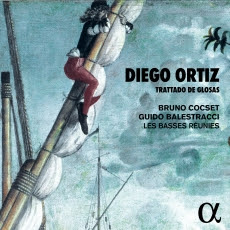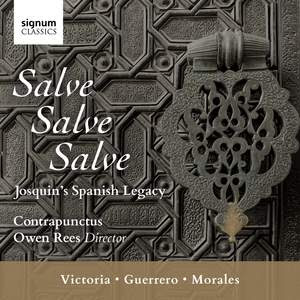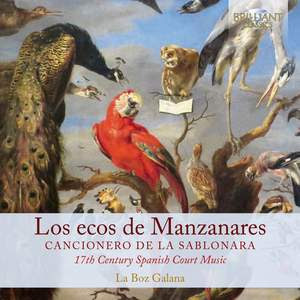Program: #20-26 Air Date: Jun 15, 2020
To listen to this show, you must first LOG IN. If you have already logged in, but you are still seeing this message, please SUBSCRIBE or UPGRADE your subscriber level today.
Josquin’s Spanish legacy, a new release of the music of Diego Ortiz, and the Sablonara songbook.
I. Diego Ortiz: Trattado de Glosas (Les Basses Réunis/Bruno Cocset/Guido Balestracci). Alpha CD 563.

2. Diego Ortiz - Recercadas del Trattado de Glosas: Recercada primera sobre el canto Ilano "La Spagna" 01:43
3. Diego Ortiz - Recercadas del Trattado de Glosas: Recercada segunda sobre el canto Ilano "La Spagna" 01:27
4. Diego Ortiz - Recercadas del Trattado de Glosas: Recercada terçera sobre el canto Ilano "La Spagna" 01:32
5. Diego Ortiz - Recercadas del Trattado de Glosas: Recercada quinta sobre el canto Ilano "La Spagna" 01:46
6. Diego Ortiz - Recercadas del Trattado de Glosas: Recercada quarta sobre el canto Ilano "La Spagna" 01:30
7. Diego Ortiz - Recercadas del Trattado de Glosas: Recercada sesta sobre el canto Ilano "La Spagna" 02:16
8. Luis Milán - Fantasia XIII por el primer y segundo tono 01:37
9. Diego Ortiz - Recercadas del Trattado de Glosas: Recercada primera sobre el madrigal "O felici occhi miei" 01:42
10. Diego Ortiz - Recercadas del Trattado de Glosas: Recercada terçera sobre el madrigal "O felici occhi miei" 01:49
11. Diego Ortiz - Recercadas del Trattado de Glosas: Recercada segunda sobre el madrigal "O felici occhi miei" 01:53
12. Diego Ortiz - Recercadas del Trattado de Glosas: Recercada quarta sobre el madrigal "O felici occhi miei" 02:02
13. Antonio de Cabezón - Diferencias sobre "La gallarda milanesa" 01:41
14. Tomás Luis de Victoria - O Magnum Mysterium 02:48
15. Diego Ortiz - Recercadas del Trattado de Glosas: Recercada quarta para violone sola 01:12
16. Diego Ortiz - Recercadas del Trattado de Glosas: Recercada primera sobre la cancion "Doulce memoire" 02:41
17. Diego Ortiz - Recercadas del Trattado de Glosas: Recercada segunda sobre la cancion "Doulce memoire" 02:53
19. Diego Ortiz - Recercadas del Trattado de Glosas: Recercada terçera sobre la cancion "Doulce memoire" 02:25
20. Diego Ortiz - Recercadas del Trattado de Glosas: Recercada quarta sobre la cancion "Doulce memoire" 02:30
21. Diego Ortiz - Recercadas del Trattado de Glosas: Recercada primera para violone sola 01:49
22. Diego Ortiz - Recercadas del Trattado de Glosas: Recercada segunda para violone sola 01:09
23. Diego Ortiz - Recercadas del Trattado de Glosas: Recercada primera sobre tenore "El passamezzo antiguo" 02:06
24. Diego Ortiz - Recercadas del Trattado de Glosas: Recercada segunda sobre tenore "El passamezzo moderno" 01:13
25. Diego Ortiz - Recercadas del Trattado de Glosas: Recercada terçera sobre tenore "El passamezzo antiguo" 01:43
26. Diego Ortiz - Recercadas del Trattado de Glosas: Recercada quarta sobre tenore "La folia" 01:21
27. Diego Ortiz - Recercadas del Trattado de Glosas: Recercada quinta sobre tenore "El passamezzo antiguo" 02:06
28. Diego Ortiz - Recercadas del Trattado de Glosas: Recercada sesta sobre tenore "La Romanesca" 01:15
29. Diego Ortiz - Recercadas del Trattado de Glosas: Recercada settima sobre tenore "La Romanesca" 01:10
30. Diego Ortiz - Recercadas del Trattado de Glosas: Recercada otava sobre tenore "La folia" 01:39
31. Antonio de Cabezón - Diferencias sobre "El Canto del Caballero" 03:09
32. Diego Ortiz - Recercada del Trattado de Glosas: Recercada sobre tenore "Aria di Ruggiero" Quinta pars 01:55
II. Salve Salve Salve: Josquin’s Spanish Legacy (Contrapunctus/Owen Rees). Signum CD SIGCD608.

This album explores Josquin’s legacy as manifest in the motets of Morales, Guerrero, and Victoria, and in Victoria’s great six-voice Missa Gaudeamus. In the hands of such composers the use of ostinato produces results that are dynamic, compelling, and striking in expressive impact. These work show the Spanish composers not just emulating Josquin but also competing to out do him in inventiveness.
Coupling powerful interpretations with path-breaking scholarship, Contrapunctus presents music by the best-known composers as well as unfamiliar masterpieces. The group’s repertoire is drawn from England, the Low Countries, Spain, Portugal and Germany, particularly in the Sixteenth and Seventeenth Centuries. The scholarly facet of the group’s work - including the discovery of long-lost music and reconstructions of original performing contexts - allows audiences to experience the first performances of many works in modern times.
Owen Rees is both an acclaimed choral director and an internationally recognised scholar of Renaissance music, particularly from Spain, Portugal and England. His scholarship consistently informs his performances in exciting and revelatory ways. His interpretations have been acclaimed as “revelatory and even visionary” (BBC Music Magazine) and as “rare examples of scholarship and musicianship combining to result in performances that are both impressive and immediately attractive to the listener” (Gramophone).
During the 16th Century, the music of Josquin Desprez became hugely sought after. Large quantities of his music were published in cathedral music books and instrumental anthologies (a huge step in this period of history). This inspired three of the greatest Spanish composers of this age - Morales, Guerrero and Victoria. In this new Signum recording, Contrapunctus and Owen Rees explore the repertoire which was produced as a result of this inspiration.
Cristóbal de Morales (c. 1500–1553)
1. Jubilate Deo omnis terra
Chant
2. Gaudeamus omnes in Domino
Missa Gaudeamus
Tomás Luis de Victoria (c. 1548–1611)
3. I. Kyrie
4. II. Gloria
5. III. Credo
Tomás Luis de Victoria
6. Salve regina
Missa Gaudeamus
Tomás Luis de Victoria
7. IV. Sanctus
8. V. Agnus
Francisco Guerrero (1527/8–1599)
9. Ave virgo sanctissima
Chant
10. Salve regina
Josquin Desprez (c. 1450–1521)
11. Salve regina
Francisco Guerrero
12. Surge propera, amica mea
III. Los ecos de Manzanares: 17th Century Spanish Court Music (La Boz Galana). Brilliant Classics CD 95978.

• The repertoire contained in this book consists of secular polyphonic songs. These pieces represent the greatest Spanish profane vocal music of the period and were composed by some of the most brilliant musicians active in the Madrid court. Many of the texts on which they were composed were written by distinguished poets of Spain’s Golden Age, such as Lope de Vega, Luis de Góngora and Francisco de Quevedo. The style of the music is representative of the transition from Renaissance polyphony to the new Baroque style.
• Performed by the Early Music group La Boz Galana, specialized in the music from the Spanish Renaissance and Baroque.
In 2011, Naxos released the first disc in a series, devoted to Spanish secular vocal music of the 17th century, generally known as tonos humanos. To date, five discs in this series have appeared, which included songs from the so-called Guerra manuscript, dating from around 1680. The disc under review here brings us to the early stages of this genre. The songs are taken from the Cancionero de Sablonara, a songbook which includes 75 polyphonic songs, written for the royal court of Madrid in the first decades of the 17th century. Its name comes from Claudio de la Sablonara, copyist and archivist of the Royal Chapel. He presented it to Wolfgang Wilhelm, Count of Nuremberg and Duke of Bavaria, who was in Madrid from 1624 to 1625. This saved the collection from the fire which destroyed many manuscripts in the Real Alcázar in Madrid in 1734. This songbook is preserved in the State Library of Bavaria, and because of that is also known as Cancionero de Munich.
The tonos humanos which are the subject of the Naxos discs, are for solo voice and basso continuo. The present disc includes only songs for two to four voices with accompaniment for a plucked instrument, either guitar or harp. They were performed by the musicians which Philip IV had at his service. The pieces performed here show the gradual shift from the style of the 16th century to that of the 17th, partly influenced by musical developments in Italy. However, the monodic style of the Guerra manuscript is absent here.
As one may expect, most songs are about love, and the authors of the texts use different images to describe the various aspects of it. Barquilla pobre de remos by Gabriel Díaz is about a boat at night, transporting Galatea. Desde las torres del alma by Juan Blas de Castro uses the image of war: "From the towers of the soul, besieged by a thousand deceptions, reason is calling the sleeping conscience. To arms, to war! Disillusions, love leads my tender years here". This song has some theatrical traits, which suggests that it may have been intended for a performance in the theatre. Ricos de galas y flores refers to nature: "Rich in finery and flowers, October and September follow April and May's flowery, verdant meadows". Unhappy love is expressed in Álvaro de los Ríos's Sin color anda la niña: "Pale is the maiden after having lost her lover". The texts are often from the pen of some of the main poets of the time, such as Lope de Vega and Francisco de Quevedo.
Some songs are based on the Folia, such as Pajarillos suaves by Álvaro de los Ríos and Romerico florido by Mateo Romero. The latter is also the composer of the seguidilla Bullicioso y claro arroyuelo. A seguidilla is a dance song of a popular nature, with lively rhythms. Another specimen of this genre is the anonymous De tu vista celoso, which includes the echo effects that were so popular in the early 17th century. It is also the best-known piece in the programme, thanks to Jordi Savall, who over the years frequently performed it with his ensembles.
Most of the composers may be unknown quantities for most music lovers. Gabriel Díaz was for some years vicemaestro de capilla of the Royal Chapel, Diego Gómes was connected to the court as an instrumentalist. Álvaro de los Ríos worked for several members of the royal family as a chamber musician, probably a singer who accompanied himself at the guitar. Mateo Romero is the odd man out in the programme, as he was not Spanish by birth. He was born as Mathieu Rosmarin in Liège in the southern Netherlands. In 1585 he moved to Madrid, where he joined the Capilla flamenca, one of the two vocal ensembles employed by Philip II. Juan Blas de Castro, who was a close friend of Lope de Vega, entered the service of Philip II and served his successors as a singer and player of plucked instruments. Bernardo Clavijo del Castillo was a keyboard player who was appointed court organist as successor to Hernado de Cabezón, the son of the famous Antonio. His Tiento lleno de 2° tono is a specimen of one of the most common genres of keyboard music at the time. Miguel de Arizo was a pupil of Díaz and entered the royal chapel after his voice broke. Lastly, two composers who were not connected to the court. Joan Pujol was born and died in Barcelona, where he also acted as maestro de capilla at the Cathedral. In between he also worked in this capacity in two other towns. He was one of the most prolific composers of sacred and secular music of his time in Spain. Manuel Rodrigues Coelho was Portuguese, and was educated as a keyboard player. Susana grosada is a set of diminutions on Orlandus Lassus's famous chanson Susanne un jour.
It is regrettable that the booklet omits any information about the composers. It does include English translations of the lyrics, but not the original texts. These are available at the Brilliant Classics site for download. These things are little blots on an otherwise outstanding production. On the basis of my experiences with later tonos humanos as well as songs from earlier songbooks, I expected to hear some fine music, and I was not disappointed. Those who have heard the performances of such music by ensembles like Hespèrion XX are in for a surprise, as these interpretations by La Boz Galana are more restrained and introverted. No battery of instruments, no percussion instruments - just four singers and a couple of plucked instruments. This allows to focus on the texts and the way composers have set them. It is up to the singers to explore the rhythms, and they do so perfectly, effectively supported by the two instrumentalists. It is all very well done. Only recently I reviewed another disc by this ensemble, which I liked a lot, and this recording confirms my positive impressions.
This is a most enjoyable disc. A Boz Galana is an ensemble to keep an eye on, and I am looking forward to future projects.
Johan van Veen
Composer Info
Diego Ortiz, Luis Milán, Antonio de Cabezón, Tomás Luis de Victoria (c. 1548–1611), Josquin Desprez (c. 1450–1521), Cristóbal de Morales (c. 1500–1553), Francisco Guerrero (1527/8–1599), Gabriel Díaz, Diego Gómes, Alvaro de los Ríos, keine Angaben, Mateo Romero, Juan Blas De Castro, Bernardo Clavijo Del Castillo, Miguel De Arizo, Manuel Rodrigues Coelho, Joan Pujol
CD Info
Alpha CD 563, Signum CD SIGCD608, Brilliant Classics CD 95978